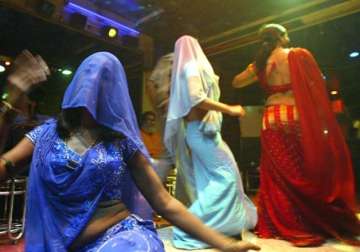History of dance bars in Mumbai, 10 unknown facts
Mumbai: After a ban of two decades on Mumbai's dance bars, the Supreme Court today allowed them to run, staying the operation of Maharashtra Police Act that prohibited dance performances at eating places, beer bars

Mumbai: After a ban of two decades on Mumbai's dance bars, the Supreme Court today allowed them to run, staying the operation of Maharashtra Police Act that prohibited dance performances at eating places, beer bars and restaurants.
The SC however has put a condition that performances should not be obscene and has given the licensing authority the power to regulate the performances.
Thousands of bar dancers celebrated the verdict by distributing sweets as it will open an employment opportunity for them and end the police harassment.
The dance bars were once considered the jewel in the crown of Mumbai's non-stop night life.
Here are some facts about Mumbai's dance bars:
1- The culture of dance bars started in Khalapur, in Raigad district, around 75 km from Mumbai, in the early 1980s.
2- The first such bar was 'Baywatch' which functioned quietly at night. Around 500-600 dancers and bar girls were brought from different parts of Mumbai and Thane in buses to the venue in late afternoons to dance at night.
3- The move soon picked up and spread like wildfire in Mumbai and Thane. At one point of time, there were an estimated 3,000 such night-bars employing over 75,000 dancers, but other estimates pegged the figure at around half a million.
4- There were some attractive and wealthy bar dancers who amassed properties worth of crores and others even struggled to sustain a respectful life. A wealthy dancer Tarannum was even raided by the Income Tax department for undisclosed income.
5- A movie “Chandni Bar" by Madhur Bhandarkar in 2001 showed the plight of bar dancers. The lead role was played by Tabu who won a National Award for her performance.
6- Dance bars were an inseparable part of Mumbai's night life. People from all age groups and classes visited those dance bars. The patrons, mostly youth or wealthy businessmen, tourists both domestic and international, enjoyed an "interactive" session with the dancers by showering them with currency notes.
7- Dance bars intrigued everybody with dancers grooving on blaring Bollywood numbers with colourful lights in a hazy airconditioned atmosphere which reeked of the smell of cigarette smoke and liquor, plus food.
8- In March 2005 then Home Minister R.R. Patil said that the government planned to ban dance bars in view of the unsavoury activities reportedly thriving there and as these allegedly corrupted the young. On Aug 15 that year, the state finally imposed the ban on dance performances in bars and restaurants, making thousands of dancers around the city jobless.
9- In April 2006, the ban was lifted by the Bombay High Court but Supreme Court continued the ban. In July 2013, the apex court struck down the government's order and said the bars could reapply for their licences and they could reopen.
10- In June 2014, the Maharashtra government amended the law to once again ban the dance bars. On October 15 2015, the Supreme Court stayed the 2014 law saying that it wasn't very different from the law passed in 2005 which they had already declared unconstitutional.
However, Maharashtra Chief Minister Devendra Fadnavis has said the state government would press its demand in the Supreme Court for continuing a ban on dance performances at bars and other places.